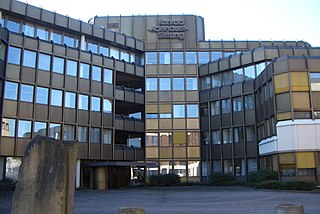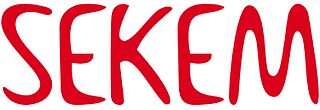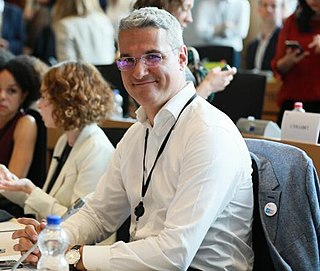
The Organization of the Black Sea Economic Cooperation (BSEC) is a regional international organization focusing on multilateral political and economic initiatives aimed at fostering cooperation, peace, stability and prosperity in the Black Sea region. It traces its origin to 25 June 1992, when Turkish President Turgut Özal and leaders of ten other countries gathered in Istanbul and signed the Summit Declaration and the "Bosphorus Statement". BSEC Headquarters – the Permanent International Secretariat of the Organization of the Black Sea Economic Cooperation – was established in March 1994, also in Istanbul.

The Konrad Adenauer Foundation is a German political party foundation associated with but independent of the centre-right Christian Democratic Union (CDU). The foundation's headquarters are located in Sankt Augustin near Bonn, as well as in Berlin. Globally, the KAS has 78 offices and runs programs in over 100 countries. Its current chairman is the former President of the German parliament Deutscher Bundestag, Norbert Lammert. It is a member of the Martens Centre, the official foundation and think tank of the European People's Party (EPP). In 2020, it ranked 15th amongst think tanks globally.

The organization SEKEM was founded in 1977 by the Egyptian pharmacologist and social entrepreneur Dr. Ibrahim Abouleish in order to bring about cultural renewal in Egypt on a sustainable basis. Located northeast of Cairo, the organization now includes:
Interreg is a series of programmes to stimulate cooperation between regions in and out of the European Union (EU), funded by the European Regional Development Fund. The first Interreg started in 1989. Interreg IV covered the period 2007–2013. Interreg V (2014–2020) covers all 27 EU member states, the EFTA countries, six accession countries and 18 neighbouring countries. It has a budget of EUR 10.1 billion, which represents 2.8% of the total of the European Cohesion Policy budget. Since the non EU countries don't pay EU membership fee, they contribute directly to Interreg, not through ERDF.
The Economics Education and Research Consortium (EERC) is an organization founded with the purpose of improving economics education and research within the Commonwealth of Independent States.

The Moshe Dayan Center for Middle Eastern and African Studies is an Israeli think tank based in Tel Aviv, Israel, focused on the contemporary study and analysis of the Middle East and Africa. Its stated primary mission is to serve as a resource for decision makers and the public at large, both in Israel and internationally, though it differentiates itself from other similar organizations by refraining from recommending specific policies outright.

Professor Dylan Jones-Evans OBE PhD FRSA was born in Bangor, Gwynedd and brought up in Pwllheli on the Llyn Peninsula. He is currently Assistant Pro-Vice-Chancellor (Enterprise) and the chair in entrepreneurship at the University of South Wales. He is visiting professor of entrepreneurship at the University of Turku in Finland, newspaper columnist and the creator of the Wales Fast Growth 50, an annual barometer of entrepreneurial firms in Wales.
Inclusive entrepreneurship is about a set of attitudes, competences and skills which allow people to turn their dreams into concrete projects or “enterprises” and then see these through to fruition. It is about more than starting an individual business. Inclusive entrepreneurship can be applied to self-employment, starting or growing micro or small enterprises and to social enterprise using business based approaches driven by social mission. Indeed, the personal qualities required for entrepreneurship are essential for success in the knowledge economy – whether this be in the private or public sectors.
Peter John Roussel Luff FRSA FRGS, is a British campaigner and activist. He has been active in a number of non-governmental organisations with varying goals. He was a Director of the Royal Commonwealth Society from 1997 to 2001, Director and Vice Chair of The European Movement UK, The International European Movement from 1986 to 1995, and Assistant Director of Amnesty International UK (1974–1978).
Gian Luca Mazzella is an Italian wine grower, former executive consultant and earlier journalist.
SEAF is an international investment management group that provides growth capital and business assistance to small and medium enterprises (SMEs) in emerging and transition markets underserved by traditional sources of capital.

The Center for Jewish-Arab Economic Development (CJAED), located in Herzliya Pituach, Israel, is a non-profit, non-governmental organization founded in 1988 by Ms. Sarah Kreimer and a coalition of Jewish and Arab businesspeople. CJAED works to promote Jewish-Arab economic cooperation as well as develop a thriving Arab sector in order to establish peace, prosperity and economic stability in Israel and the region. The center's main premise is that Israel's primary resource is its people, therefore a vibrant and stable economy requires an integrated society. In 2010, CJAED was recognized as one of the "Ten Top Israeli Business Ventures" that promote peace in the Middle East.
This article covers the best practices and needs for reform in entrepreneurship policies in Egypt.
Facila is a training program, in Southern Europe, for adults with short primary schooling. The objective is to prepare students for validation processes and secondary education. Many participants are entrepreneurs, owners or employees of small and medium enterprises, SME:s. In these cases the program provides opportunity for training in entrepreneurship and "continuous improvement" to enhance the participant's employability.

Baybars Altuntaş is a Turkish entrepreneur, angel investor, speaker and author based in Istanbul. He founded Deulcom International, a vocational training school in Turkey in 1992 and currently serves as the president of the executive committee of the company. He is currently a jury member on the new Turkish entrepreneurship program and is the current host of the Turkish version of The Weakest Link, En Zayıf Halka

The Juncker Commission was the European Commission in office from 1 November 2014 to 30 November 2019. Its president was Jean-Claude Juncker, who presided over 27 other commissioners. In July 2014, Juncker was officially elected to succeed José Manuel Barroso, who completed his second five-year term in that year.
Science and technology in Armenia describes trends and developments in science, technology and innovation policy and governance in Armenia.
The relationship between Azerbaijan and Organization of the Black Sea Economic Cooperation dates back to 1992 when Azerbaijan signed Istanbul Summit Declaration and the Bosphorus Statement.

Dragoș Pîslaru is a Romanian economist and politician of REPER who has been serving as a Member of the European Parliament since 2019. He was previously a member of USR PLUS/USR. He also held the position of Minister of Labor, Family, Social Protection and the Elderly in the government of Prime Minister Dacian Cioloș from 18 April 2016, until 4 January 2017.









